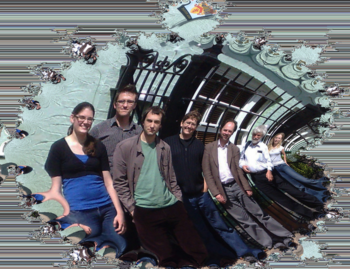Panton Principles: Difference between revisions
Jump to navigation
Jump to search


imported>Daniel Mietchen (intralinks) |
imported>Daniel Mietchen (image) |
||
| Line 1: | Line 1: | ||
{{subpages}} | {{subpages}} | ||
{{Image|Panton-Principles-Drafters-Fractal-Trace.png|right|350px| | {{Image|Panton-Principles-Drafters-Fractal-Trace.png|right|350px|Data sharing provides fertile ground for derivative work: Once some data were released into the [[Public Domain]], any reuse or modifications are permitted. With legal claims to the source being waved to the maximal extent possible, [[community norms]] are invoked for usage guidance, the most essential ones within the scientific community being proper attribution as well as documentation of any further processing. This image is based on the [[:Image:Panton-Principles-Drafters-Original.png|original photo]] of the drafters of the Panton Principles in front of the [[Panton Arms]] pub and was obtained by means of [[:Image:Fractal-Trace-Gimp-Panton-Principles-Settings.png|this transformation]].}} | ||
The '''Panton Principles''' are a set of recommendations on how to share [[data (general)|data]] that resulted from [[scientific research]]. Their name derives from the [[Panton Arms]] pub in [[Cambridge, UK]] in which they (often abbreviated PP for short) were drafted. | The '''Panton Principles''' are a set of recommendations on how to share [[data (general)|data]] that resulted from [[scientific research]]. Their name derives from the [[Panton Arms]] pub in [[Cambridge, UK]] in which they (often abbreviated PP for short) were drafted. | ||
The main motivation behind the Panton Principles is that data do not fall under [[copyright]] but that their legal status should be clearly defined with respect to reuse and modification, and clearly signaled. | The main motivation behind the Panton Principles is that data do not fall under [[copyright]] but that their legal status should be clearly defined with respect to reuse and modification, and clearly signaled. | ||
Revision as of 20:29, 23 March 2010

PD Image
Data sharing provides fertile ground for derivative work: Once some data were released into the Public Domain, any reuse or modifications are permitted. With legal claims to the source being waved to the maximal extent possible, community norms are invoked for usage guidance, the most essential ones within the scientific community being proper attribution as well as documentation of any further processing. This image is based on the original photo of the drafters of the Panton Principles in front of the Panton Arms pub and was obtained by means of this transformation.
Data sharing provides fertile ground for derivative work: Once some data were released into the Public Domain, any reuse or modifications are permitted. With legal claims to the source being waved to the maximal extent possible, community norms are invoked for usage guidance, the most essential ones within the scientific community being proper attribution as well as documentation of any further processing. This image is based on the original photo of the drafters of the Panton Principles in front of the Panton Arms pub and was obtained by means of this transformation.
The Panton Principles are a set of recommendations on how to share data that resulted from scientific research. Their name derives from the Panton Arms pub in Cambridge, UK in which they (often abbreviated PP for short) were drafted.
The main motivation behind the Panton Principles is that data do not fall under copyright but that their legal status should be clearly defined with respect to reuse and modification, and clearly signaled.